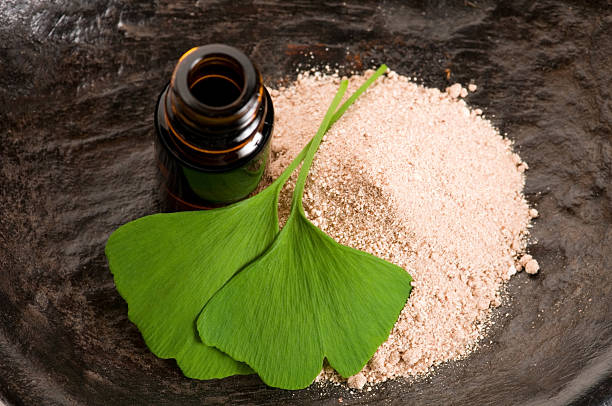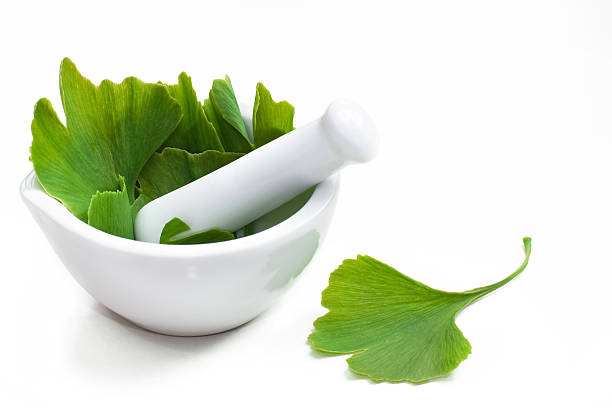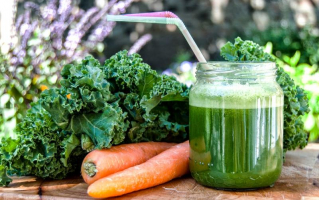Top 10 Health Benefits of Ginkgo Biloba
Ginkgo biloba, often known as maidenhair, is a Chinese tree that has been cultivated for thousands of years for several purposes. It is frequently referred to ... read more...as a living fossil since it is the last surviving member of an ancient order of plants. While the leaves and seeds are frequently used in traditional Chinese medicine, current research focuses mostly on ginkgo extract, which is prepared from the leaves. Ginkgo supplements are connected with a variety of health claims and applications, the majority of which center on brain function and blood circulation. Here are the greatest ginkgo biloba advantages.
-
Many of ginkgo's health claims may be due to its high antioxidant concentration. Ginkgo includes a high concentration of flavonoids and terpenoids, which are antioxidant chemicals. Antioxidants protect against or mitigate the harmful effects of free radicals. Free radicals are highly reactive particles created by the body during regular metabolic operations such as food conversion and detoxification.
They may, however, cause harm to healthy tissues, resulting in accelerated aging and disease development. The antioxidant benefits of ginkgo are being studied. However, it is not apparent how it works or how useful it may be in treating certain disorders.

Contains Powerful Antioxidants 
Contains Powerful Antioxidants -
Inflammation is a normal response of the body to damage or invasion by a foreign substance. During the inflammatory response, several immune system components are recruited to attack the foreign invader or repair the wounded region. Even when there is no illness or damage, certain chronic conditions cause an inflammatory response. Excessive inflammation can cause lasting harm to the body's tissues and DNA over time. Years of animal and laboratory studies have shown that ginkgo extract can lower inflammatory markers in both human and animal cells in a number of disease situations.
Some specific conditions in which ginkgo extract has been shown to reduce inflammation include:
- Arthritis
- Irritable bowel disease (IBD)
- Cancer
- Heart disease
- Stroke
While this data is encouraging, human studies are needed before drawing concrete conclusions about ginkgo’s role in treating these complex diseases.

Can Help Fight Inflammation 
Can Help Fight Inflammation -
Ginkgo seeds were employed in traditional Chinese medicine to open "channels" of energy to many organ systems, including the kidneys, liver, brain, and lungs. Many of ginkgo's alleged advantages may stem from its apparent capacity to enhance blood flow to various regions of the body. In one research, persons with heart problems who took ginkgo supplementation had an instantaneous improvement in blood flow to numerous regions of the body. This was ascribed to a 12% rise in circulation nitric oxide levels, a chemical responsible for blood channel dilation. Another study found the same effect in older persons who were given ginkgo extract.
More study indicates that ginkgo has beneficial benefits on heart health, brain health, and stroke prevention. There are several possible explanations for this, one of which is that the plant contains anti-inflammatory chemicals. More study is required to completely comprehend how ginkgo impacts circulation, heart, and brain health.

Improves Circulation and Heart Health 
Improves Circulation and Heart Health -
Ginkgo has been studied extensively for its capacity to alleviate worry, tension, and other symptoms linked with Alzheimer's disease, as well as cognitive impairment related to age. Overall, study findings in this field are inconclusive. Some trials utilizing ginkgo demonstrate a significant decrease in the rate of cognitive deterioration in patients with dementia, whereas others fail to duplicate this outcome. An analysis of 21 research found that when used with standard treatment, ginkgo extract may improve functional abilities in people with moderate Alzheimer's.
Another study included four studies and discovered a substantial decrease in a range of dementia-related symptoms when ginkgo was administered for 22-24 weeks. These encouraging findings might be attributed to the function that ginkgo may have in increasing blood flow to the brain, particularly in vascular dementia. Overall, it is too early to conclusively assert or disprove ginkgo's involvement in dementia treatment, although current research is beginning to clarify this issue.

Reduces Symptoms of Psychiatric Disorders and Dementia 
Reduces Symptoms of Psychiatric Disorders and Dementia -
Ginkgo may improve brain function in healthy people, according to some research. A modest number of research suggest that supplementing with ginkgo may improve mental function and perceived well-being. The findings of research like these have given rise to assertions that ginkgo improves memory, focus, and attention span. A major assessment of the data on this link, however, revealed that taking ginkgo did not result in any quantifiable gains in memory, executive function, or attention ability. While taking ginkgo may boost mental capacity, there are no certainties.
According to several studies, taking ginkgo may help with anxiety symptoms. A number of animal studies have found decreases in anxiety symptoms, which may be due to ginkgo's antioxidant content. One trial included 170 participants with generalized anxiety who were given either 240 mg or 480 mg of ginkgo or a placebo. When compared to the placebo group, the group given the highest dose of ginkgo reported a 45% reduction in anxiety symptoms. While taking ginkgo may help with anxiety, the present data is insufficient to draw conclusive conclusions.

Improves Brain Function and Well-Being 
Can Reduce Anxiety -
Ginkgo supplements may help relieve the symptoms of depression, according to a study of animal research. Ginkgo-supplemented mice responded to an unavoidably unpleasant environment less emotionally than mice that did not get the supplement.
According to the study, ginkgo's anti-inflammatory characteristics, which enhance the body's capacity to adapt when levels of stress hormones are high, are responsible for this impact. However, depression is a complicated disorder that might have a number of underlying reasons. To learn more about ginkgo and how it could impact depression in people, more study is required.

Can Treat Depression 
Can Treat Depression -
How ginkgo affects eyesight and eye health has seldom been the subject of any research. However, the first findings are encouraging. Ginkgo supplementation improved blood flow to the eye in glaucoma patients, according to one study, although this didn't always result in clearer vision. Another analysis of two research looked at how ginkgo extract affected the development of age-related macular degeneration. Although some people claimed to have improved their vision, this wasn't often statistically significant.
Many of these encouraging findings appear to be connected to improved blood flow to the eye. It's uncertain if ginkgo would improve eyesight in those who don't currently have it. More study is needed to see if ginkgo may improve eyesight or halt the course of degenerative eye disease.

Support Vision and Eye Health 
Support Vision and Eye Health -
Ginkgo is a particularly well-liked headache and migraine remedy in traditional Chinese medicine. There is not much information on ginkgo's effectiveness in treating headaches. It could, however, depend on the underlying reason for the headache. Ginkgo, for instance, is widely known for its anti-inflammatory and antioxidant properties. Ginkgo could be helpful if excessive stress is the cause of a headache or migraine.
Furthermore, if a headache is caused by decreased blood flow or constricted blood vessels, ginkgo's ability to widen blood vessels may alleviate symptoms. On the contrary, some migraines are caused by excessive blood vessel dilatation. Ginkgo may have little or no impact in this circumstance. However, these instances are only inferences and do not replace real facts. If you wish to try ginkgo for your migraines, it is unlikely to be harmful. Just be aware that it may not always be beneficial.

Can Treat Headaches and Migraines 
Can Treat Headaches and Migraines -
According to several studies, ginkgo may reduce the symptoms of COPD and other inflammatory respiratory conditions like asthma. It is believed that the anti-inflammatory properties of ginkgo may help to minimize airway inflammation and boost lung capacity. A 75-person trial looked at the effectiveness of using ginkgo extract together with glucocorticosteroid treatment to treat asthma symptoms. In comparison to individuals who only got conventional medicine, those who took ginkgo had much lower amounts of inflammatory chemicals in their saliva.
Another research of 100 participants looked at the efficacy of a combination of Chinese medicines, including ginkgo, for treating COPD symptoms. When compared to the control group, those who took the herbal mixture reported a significant reduction in cough and bronchitis after a three-month follow-up. At this time, it is unclear whether the improvement may be due to ginkgo alone or to the synergistic action of the other herbs in the treatment group composition. While these findings are promising, additional study on this particular use of ginkgo is required.

Can Improve Asthma and COPD Symptoms 
Can Improve Asthma and COPD Symptoms -
According to some reports, ginkgo may be used to treat sexual dysfunctions such as erectile dysfunction or low libido. Ginkgo has the capacity to increase blood nitric oxide levels, which improves circulation via the dilatation of blood vessels. As a result, by boosting blood flow to specific parts of the body, ginkgo may be effective in treating different symptoms of sexual dysfunction. Some studies have looked at utilizing ginkgo to treat sexual dysfunction induced by antidepressant medication (SSRIs). In these circumstances, the results showed that ginkgo was no more beneficial than a placebo. Furthermore, there may be an interaction between ginkgo and SSRI drugs, making them less effective.
In one study, women who were also receiving sexual psychotherapy were given ginkgo to boost their sexual desire and happiness. Compared to a placebo, the combination of ginkgo and treatment was more beneficial over time, whereas ginkgo alone did not. Although there is logic in utilizing ginkgo to cure sexual dysfunction, there is currently no evidence to back this up.

Treats Sexual Dysfunction 
Treats Sexual Dysfunction































